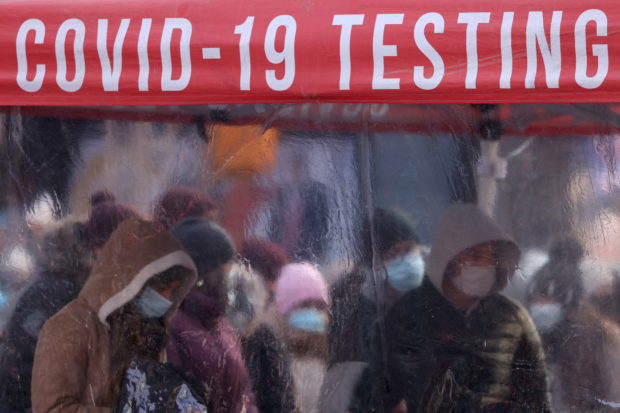Is COVID retreating in the U.S.? Data paints encouraging scenario

People queue to be tested for COVID-19 in Times Square, as the Omicron coronavirus variant continues to spread in Manhattan, New York City, U.S., December 20, 2021. (REUTERS)
NEW YORK – New coronavirus cases are falling in parts of the United States hit hardest by the fast-spreading Omicron variant, according to a Reuters analysis of public health data, offering an early indication the virus might once again be in retreat.
COVID-19 infections have decreased in 19 states plus Washington, D.C. and Puerto Rico, an analysis of the past week through Thursday compared with the prior week showed.
In the Northeast, which saw some of the highest case loads during the latest surge, infections are down 40% week-over-week.
“Certainly it bodes well for us in terms of the trajectory of Omicron,” said Wafaa El-Sadr, a professor of epidemiology and medicine at Columbia University in New York City.
The drop was more modest at the national level, with new reported COVID-19 cases down 7% during the same time period, according to the Reuters tally, as Omicron surges in some other parts of the country.
COVID-19 data often lag a few days behind the actual state of affairs.
In the Midwest, cases climbed 11% over the past seven days compared with the previous week, and were up 2% in the South, although the increase has slowed considerably in recent weeks. Western states saw a 3% week-over-week drop in new infections, according to the tally.
Nationally, new cases are averaging a still-high 738,000 a day, down from a peak of 805,000 on Jan. 15.
Deaths, which usually lag new infections by about three weeks and are occurring primarily among the unvaccinated, are averaging more than 2,000 a day, up 50% from the start of the month. That is highest average number of COVID-19 deaths since the end of September, but lower than the record of 3,300 lives lost a day in January 2021.
COVID hospitalizations, also a lagging indicator, set a record on Thursday at 152,746, according to the Reuters tally, but have been showing signs of stabilizing at around 150,000 over the past week.
‘NOT OUT OF THE WOODS’
“We have to be cognizant that we’re not out of the woods, that there’s a glimmer of hope, there is light at the end of the tunnel,” El-Sadr said. “That light is closer or further away based on who you are and where you happen to be.”
Many hospital systems across the country are still struggling to cope with the Omicron-driven surge. Last week, the administration of President Joe Biden said it was sending military health workers to hospitals in six U.S. states to help fight the deluge of cases and staff shortages.
The federal government also recently began providing Americans with access to free at-home COVID-19 tests and will soon make millions of N95 masks available after Biden incurred criticism that he was not devoting enough efforts beyond vaccines to fight the pandemic .
The rapid spread of Omicron over the winter holidays forced many Americans to put the brakes on plans for a gradual return to normal life as the United States entered its third pandemic year.
Classes were canceled or delayed in some school districts, the ranks of teachers and staff decimated by illness and safety requirements. Exhausted parents were left to navigate a patchwork of school COVID-19 policies while some students, feeling unsafe in school buildings, staged walkouts demanding a switch to remote learning.
Businesses changed or postponed back-to-office plans, while the sweeping surge forced entertainment venues and understaffed restaurants to temporarily shut down.
However, the recent drop in cases in first and hard-hit states like New York and New Jersey is not the only cause for optimism.
El-Sadr, the epidemiology professor, pointed to positive developments in the current fight against the pandemic, including that Omicron has proven to be milder compared to previous versions of the coronavirus, the great protection of vaccines against severe illness and the potential for mRNA vaccines to be adapted quickly to new variants.
gsg
For more news about the novel coronavirus click here.
What you need to know about Coronavirus.
For more information on COVID-19, call the DOH Hotline: (02) 86517800 local 1149/1150.
The Inquirer Foundation supports our healthcare frontliners and is still accepting cash donations to be deposited at Banco de Oro (BDO) current account #007960018860 or donate through PayMaya using this link.














